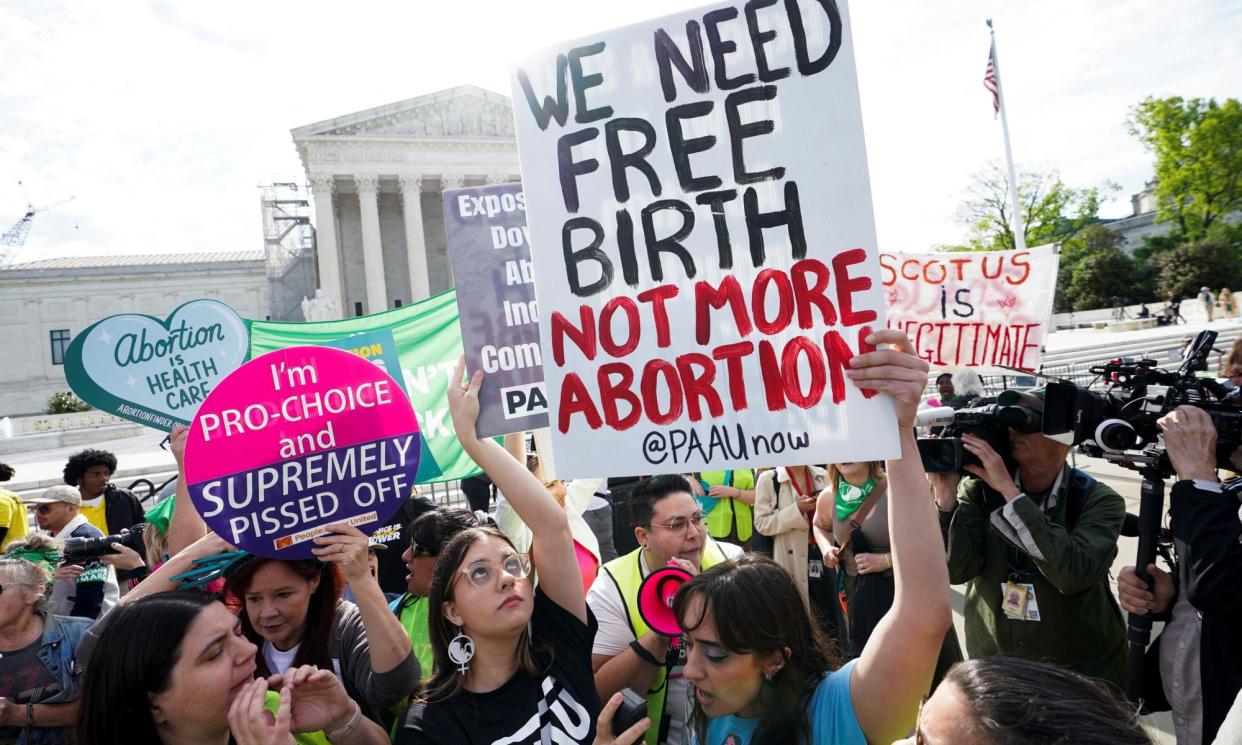Arizona’s abortion U-turn points to Republican break from anti-abortion movement

In the two years since the US supreme court overturned Roe v Wade, the 50-year-long partnership between Republicans and anti-abortion activists has steadily fractured as political backlash to abortion bans has mounted. But perhaps the biggest crack emerged on Wednesday, when Arizona’s Republican-controlled state legislature moved to repeal the state’s 1864 near-total abortion ban.
After days of national outcry over an Arizona supreme court ruling that upheld the 1864 ban, passed before Arizona became a state, three Republicans in the state house broke ranks to vote with Democrats to support a repeal. Last week, two Republicans in the state senate also voted with Democrats to advance a similar repeal. As long as those Republican votes hold firm, Democrats will likely send the repeal to Arizona’s Democratic governor in May.
Before the Wednesday vote, anti-abortion activists spent days lobbying Republicans to stand against the repeal. Yet despite their obvious displeasure afterward, some anti-abortion activists have held their fire. Rather than immediately threatening to primary the Republicans who defected from their cause, some advocates have struck a relatively muted tone, grudgingly urging lawmakers to at least back a 15-week ban, which is currently in effect in Arizona.
Related: Alabama IVF ruling leaves Republicans stuck between their base and the broader public
Before the fall of Roe, anti-abortion activists were becoming increasingly hardline, often pressuring the GOP to drop candidates who lacked anti-abortion bona fides. But after Wednesday, rather than directing their ire at the Republicans who are making the repeal possible, they have largely blamed the usual suspects: abortion rights advocates. “The most protective pro-life law in the country is poised to fall to the appetites of pro-abortion activists,” Cathi Herrod, president of the powerful Center for Arizona Policy, said in a statement, adding that she supported efforts to “defend the state’s 15-week law if the pre-Roe law was repealed”.
Marjorie Dannenfelser, president of SBA Pro-Life America, joined Herrod in defending the 15-week ban. Abortion foes are fearful of a potential November ballot measure to enshrine abortion rights in the state constitution.
“Kari Lake and all GOP candidates and elected officials must bring clarity to Arizona voters by campaigning vigorously in support of Arizona’s 15-week protection with exceptions and in opposition to the extreme no-limits abortion amendment,” Dannenfelser said in a statement of her own, which also mourned the probable fall of the 1864 law. Kari Lake, running to represent Arizona in the US senate, has in recent days, repeatedly flip-flopped on her position on abortion.
Ingrid Duran, state legislative director for the National Right to Life, another leading anti-abortion organization, said she was “surprised” by the Arizona Republicans’ change of heart. But she said she believes the movement’s overall relationship with the GOP can recover.
“I feel like this pivot has been solely based on some of the fear mongering that has been taking place from our opposition, and the people are responding to that, and some are caving into this pressure,” Duran said in an interview. “We have always been a movement that has been there for the long haul. And even with a setback like this, I don’t think that that should deter us from trying to save as many lives as possible.”
Next year, Duran said, her organization may try to once again pursue some kind of abortion ban in Arizona, such as a six-week ban.
“Arizona has some of the most radical anti-abortion activists around,” said Jennifer Holland, a US history professor at the University of Oklahoma and the author of Tiny You: A Western History of the Anti-Abortion Movement. “But I do think that now, after Roe’s been overturned, the movement is fragmenting a little bit more in terms of strategy, partly because the political landscape is just so different.”
Between 1973, when the US supreme court decided Roe, and 2022, when the court overturned it, the GOP and the anti-abortion movement grew to operate in lock-step. The anti-abortion movement handed Republicans ardent voters; in exchange, Republicans in state legislatures voted in favor of abortion restrictions.
For the GOP, those votes were a cheap way to build a base, since the constitutional right to abortion that Roe established blocked many abortion restrictions from going into effect and thus shielded Republicans from political fallout.
But now that Roe is gone, the GOP has struggled to distance itself from its own policies. Outrage over Roe’s death cost Republicans votes in the 2022 midterms. A flurry of ballot measures to protect abortion rights have succeeded even in states as red as Kansas and Kentucky.
Ultimately, failures in state races and legislatures will amp up anti-abortion activists’ focus on the presidential race, and the possibility for a national abortion ban that could come with a Donald Trump victory, according to Holland.
“The more that they lose in places like Arizona and West Virginia and Kansas, I think that there’s even more pressure for national bans,” Holland said. “This movement has this moral goal. It is neither here nor there whether it is democratically reached or democratically supported. The goal is there should be no abortion because it’s murder. So if that principle loses in more and more states, then the only solutions that achieve that goal are federal.”
